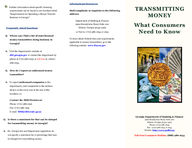Further information about specific licensing requirements can be found in our brochure titled "Requirements for Operating a Money Transfer Business in Georgia".
Frequently Asked Questions
Q. Where can I find a list of state-licensed money transmitters doing business in Georgia?
A. Visit the Department's website at: dbf.georgia.gov or contact the Department by phone at (770) 986-1633 or toll-free at 1-(800) 986-1633.
Q. How do I report an unlicensed money transmitter?
A. To report unlicensed companies to the Department, mail complaints to the address shown on the cover and at the end of this brochure or:
Contact the MSB Division at: Phone: (770) 986-1656 Fax: (770) 986-1655 E-mail: MSB@dbf.state.ga.us
Q. Is there a maximum fee that can be charged for transmitting money in Georgia?
A. No. Georgia law and Department regulations do not specify a maximum fee or percentage that may be charged for transmitting money.
Informational Resources
Mail complaints or inquiries to the following address:
Department of Banking & Finance 2990 Brandywine Road, Suite 200
Atlanta, Georgia 30341-5565 or Fax to: (770) 986-1654 or 1655
To learn about Federal laws and requirements applicable to money transmitters, go to the following website: www.fincen.gov
TRANSMITTING MONEY
What Consumers Need to Know
Georgia Department of Banking & Finance 2990 Brandywine Road, Suite 200 Atlanta, Georgia 30341-5565 Phone: (770) 986-1633 Fax: (770) 986-1654 or 1655 Website: http://www.gadbf.org
Toll Free Consumer Hotline: (888) 986-1633
TRANSMITTING MONEY - WHAT CONSUMERS NEED TO KNOW
During the 2003 legislative session, the Georgia legislature passed a bill that implemented licensing requirements for money transmitters. The bill became effective on 7/1/2003. The bill was incorporated in Georgia Code Sections 7-1-680 through 7-1-689.1.
The implementation of licensing requirements for money transmitters gives the Department of Banking & Finance (Department) the authority to regulate companies that are receiving money from people for transmission, particularly transmission abroad, and to establish a minimum level of financial responsibility for all entities engaging in the business of receiving money for transmission, without regard to the method of transmission.
"Money transmission." Money transmission means engaging in the business of receiving money for transmission or transmitting money within the United States or to locations abroad by any and all means including, but not limited to, an order, wire, facsimile, or electronic transfer.
IVTS or "informal value transfer system" operators fall into this definition. IVTS refers to any system, mechanism, or network of people that receive money for the purpose of making the funds or an equivalent value payable to a third party in another geographic location, whether or not in the same form. The transfers generally take place outside of the conventional banking system through non-bank financial services companies or other business entities whose primary business activity may not be the transmission of money. Depending on the ethnic group, IVTS are called by a variety of names including, for example, "hawala" (Middle East, Afghanistan, Pakistan); "hundi" (India); "fei ch'ien" (China); "phoe kuan" (Thailand); and "Black Market Peso Exchange" (South America).
STATE-LICENSED MONEY TRANSMITTERS IN GEORGIA
You are advised to use a financial institution, the U.S. Postal Service, or a state-licensed money transmitter to send or wire money within the U.S. or abroad. Financial institutions (i.e. banks, credit unions, savings banks, etc.) and the U.S. Postal Service are exempt from the licensing requirement.
Money transmitters use various methods to send money to a specific destination in a foreign country. Licensees often have agents who receive money from consumers to transmit outside of the U.S. The authorized agent of a licensee does not need a separate license to engage in the business of money transmission in Georgia.
In order to engage in money transmission in Georgia, the law requires that a person (except those exempt) must first obtain a license from the Department, pursuant to O.C.G.A. Title 7, Article 4 (Sale of Checks or Money Orders Act).
KEEP YOUR RECEIPT!!!
Whether you use the licensee or an agent of the licensee to send money, you must be provided with a written receipt or other evidence of acceptance of the transmission order.
The written receipt must have the following information:
(1) the name of the licensee (or trade name of the licensee as registered with the Department),
(2) agent identifier information, (3) the date the transmission order was placed,
(4) the dollar amount of the transmission order, and (5) the fee charged.
To ensure that you are doing business with a licensed money transmitter in Georgia you should:
Look for evidence that the money transmitter (or authorized agent) is licensed by the Department. The transmitter's license (or a copy thereof) should be prominently displayed in the premises where transmission of money occurs. In lieu of displaying the license, window decals and other advertising material relative to money transmission should indicate that the transmitter is "LICENSED BY THE GEORGIA DEPARTMENT OF BANKING AND FINANCE".
For additional license verification, check the Department's website at: dbf.georgia.gov
Click on the Check Sellers & Money Transmitters radio button and click the Submit Query button to get a full list of current licensees.
OTHER THINGS YOU SHOULD KNOW
All licensed money transmitters are required to maintain a surety bond. The bond requirement is a measure designed to protect the public, but also to deter companies that have questionable solvency or business practices from entering the market.
Money transmitters generally are responsible to a customer for the amount of money transmitted, plus any fees charged to the customer for the service provided.
Shop around. Fees and currency exchange rates charged by individual money transmitters vary greatly and affect the total currency sent to the beneficiary. Currently, there is no regulation of fees charged.
